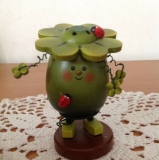ちばけんさんの おぼえた日記 - 2016年4月7日(木)

この日記をフォローしているユーザ
この日おぼえたフレーズ(英語・中国語・ハングル)
- おぼえたフレーズはありません。
おぼえた日記
〇NEWS
Divorce or death of spouse contributes to strokes
離婚・配偶者と死別 脳卒中リスク高くなる
NHK WORLD April 4
Japanese scientists have found that people who have divorced or lost a spouse are more susceptible to strokes than those who have not.
*spouse 配偶者 *strokes (脳卒中など)発作
*susceptible 影響され易くて
Scientists at the National Cancer Center, Osaka University and others conducted the study.
The subjects, nearly 50,000 people in 8 prefectures in Japan, were between the ages of 45 and 74. Researchers tracked them for about 15 years to learn how losing a spouse through divorce or death can contribute to suffering strokes.
*contribute ・・の一因となる
Researchers learned that those who have lost a spouse, regardless of sex, were 26 percent more likely to suffer strokes.
In particular, men were 48 percent more susceptible to cerebral hemorrhages and subarachnoid hemorrhages, and women, 35 percent more susceptible.
*cerebral 脳の *hemorrhages出血
The scientists also say women without a regular occupation who have divorced or lost a spouse were nearly 3 times more likely to have strokes when compared to married women with jobs.
Osaka University associate professor Kaori Honjo points out the need for members of society to keep an eye on people who have lost a spouse and are exposed to lifestyle changes or mental stress.
離婚・配偶者と死別 脳卒中リスク高くなる
日本の研究者は離婚したり、配偶者と死別したりした人は、そうではない既婚者に比べて、脳卒中になるリスクが高くなるという研究成果を見出した。
この研究を行ったのは、国立がん研究センターと大阪大学などのグループ。
グループでは、岩手県や長野県など8つの県に住む45歳から74歳までの男女5万人近くをおよそ15年間追跡し、離婚したり、配偶者と死別したりすることと脳卒中になるリスクとの関係を調べた。
その結果、離婚したり、配偶者と死別したりした人はそうではない既婚者に比べ、男女ともに脳卒中になるリスクが26%高くなり、脳卒中の中でも脳出血やくも膜下出血になるリスクは男性で48%、女性で35%高い。
また女性で無職の人が離婚したり、死別したりした場合職を持つ既婚の女性と比べ、脳卒中になるリスクは3倍近く高い。という。
〇パートナーが他界した後に人が後を追うようにして死去するというのは、よく聞く。お互い大事にするしかないですね。
〇基礎3
I’m so happy
とてもうれしいわ
(ユキチとアスカ、ダグラスが登校しています)
ア: ダグは学校のバスケのチームに加わりたいと思っているのよ。
ユ: わー、バスケ上手なの?
ダ: それほどでもないんですが好きです。どんなスポーツをしますか?
ユ: 剣道部のメンバーなんだ、でもぼくもあまり上手ではないんだ。
ア: 見て! あの犬 *Look! That dog!
ユ: あー! 高橋さんのところの犬だ!
ダ: どうしましたか?
ア: 家の前を通るといつも具合が悪かったのよ。
ユ: 足の骨が折れているみたいなんだ。
ア: でも、もう大丈夫そうね!
ユ: よかった!
ア:とてもうれしいわ。
ダ: 私もうれしいです。 とてもかわいいですね。
ユ: あっ! もう8時半。 走ろう!
*Doug is interested in joining the basketball team in school.
●be interested in … ~に興味がある ●join ~に加わる
*Wow, are you a good basketball player?
*Not so good, but I like it. What sport do you play?
●not so good あまり上手でない
*I am a member of the kendo club, but I am not so good, either.
●not … either ~もない
*Oh, Mr. Takahashi’s dog!
*What’s the matter?
*Every time we walked in front of his house, that dog was sick.
●every time … ~するたびに 接続詞のように使う場合もある
*I guess his dog leg was broken.
●broken 折れた
*But he looks OK now!
●look OK 大丈夫みたい
*Great!
*I’m so happy.
*I’m happy, too. He is so cute.
*Oh! It’s already 8;30. Let’s run!
I am a member of the kendo club, but I am not so good, either.
![]() /english/phrase/83266
/english/phrase/83266
I blew it, every time I was given a chance.
![]() /english/phrase/1833
/english/phrase/1833














